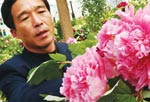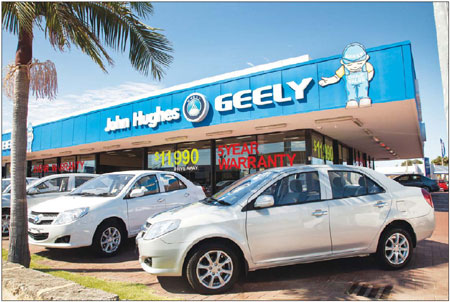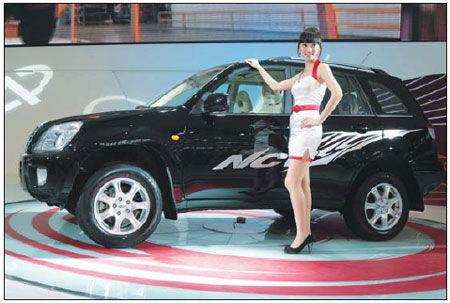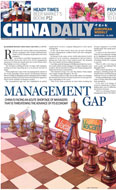Cars
Gearing up from Down Under
Updated: 2011-03-18 11:40
(China Daily European Weekly)
|
|
Chinese vehicle manufacturers are testing Australia’s waters before heading to Europe
The Australian car market may not be big - about 1 million vehicle sales a year - but it has now become a testing ground for a wave of Chinese car manufacturers, which have their eyes set on Europe, North America and beyond.
This month, Chery launched two new models in Sydney and plans to release a third in July. Great Wall Motors, which launched its Australian campaign in 2009, has already made inroads with its range of sports utility vehicles (SUVs) and work pick-up trucks, while Geely Motors, which now owns Volvo, has started selling cars in Western Australia.
Two other companies, JAC and Foton, are expected to hit Australian showrooms by the end of 2011, while a sixth, an as-yet unnamed brand, has advertised for staff and called for expressions of interest in dealership franchises.
In a country where roads are long and cars are expensive, Chery and the other car-makers are about to carve a big question mark in an auto landscape dominated by and divided between traditional local, Japanese and European brands.
The move is not only capturing the attention of Australian car buyers but also grabbing the attention of motoring executives from around the world who are closely monitoring the progress of this sales assault in a mature and developed auto market.
Like all new entrants, the marketing campaign is spearheaded by price and value.
The Chery J1 baby hatch goes on sale for A$11,990 (8,600 euros), about the same amount paid for a new Toyota Corolla in 1986.
The J11 compact SUV, which at A$19,990 (14,700 euros) is by far the cheapest soft-roader on the market. It not only boasts the lowest price but it also includes add-ons, such as leather trim and air-conditioning. The third model, a 4WD, will be launched in July. Rising fuel prices may also help Chery's cause as car buyers rethink how to spend their motoring dollars.
In China the J1, J3 and J11 are known as the A1, A3 and Tiggo, but the names were changed because of Audi, which already sells an A3 and will introduce the A1.
Chery is partnered with Ateco Automotive, Australia's largest independent importer with a portfolio that also includes another Chinese brand, Great Wall, as well as Fiat, Alfa Romeo, Citroen, Maserati and Ferrari. Ateco was also responsible for importing South Korean cars with great success in the 1990s. Chery's main competitors in Australia will be Hyundai and Kia.
"We're aiming to price the Chery below the Koreans (brands) but with a specification advantage," says Dinnesh Chinnappa, Ateco's general manager of new ventures. "If the Koreans don't have alloy wheels, we'll do alloy wheels (for Chery)."
Daniel Cotteril, of Ateco Automotive, says Australian car buyers are notoriously conservative, traditionally seeking big cars from big brands. That mindset is now changing and the entrance of Chery would prove advantageous to buyers.
"Australian car buyers expect to get a lot from a car for not too much money. That's partly a product of our very competitive market. We sell a million cars domestically with market share split over 60 manufacturers. Because it is a large country with wide-open spaces, we traditionally like large, powerful cars," Cotteril says.
Chery, like its South Korean and Japanese predecessors, is expected to move slowly in the short term, before taking its place as a household name in the Australian market next to Kia, Mazda and Toyota.
It aims to sell 5,000 vehicles in Australia in 2011, and plans to increase the number of local sales outlets from 45 to 90 in two years.
Cotteril says that sales could potentially snowball. "We conservatively expect to sell, within the next few months, a rate of 100-150 J1s per month and between 200-300 J11s through 45 dealers initially. That number will expand over the coming year and we would expect to see sales rise over time."
|
|
Further down the track Chery will launch a Toyota Hiace-style van (the H5) on its way to offering five models by 2015. By that time, Chinese car brands could account for sales of more than 100,000 vehicles - or 10 percent of the market, says Ateco.
The biggest hurdles for Chinese car brands in Australia, and in developed markets, are safety and acceptance. Chery is the first four-star car in China NCAP tests but has yet to undergo the Australian safety test equivalent, the ANCP.
Great Wall, which only has a two-star ANCAP rating, also came under scrutiny when its seatbelts failed during a safety test. The Australian Department of Infrastructure and Transport officially ordered the V240 model be recalled on Dec 15, 2009 and requested the seatbelts be replaced in the entire batch of 115 cars that the test vehicle was plucked from.
But despite the safety scare, the budget-priced Great Wall was the surprise hit of the Australian market last year, with strong marketing and a growing reputation as providing bang for the strong Australian dollar.
As an automotive expert with a strong knowledge of the Asian car industry, Cotteril suggests that it will be the growing strength and reputation of Chinese engineering that will determine the success of the Chery in a traditionally inward-looking and conservative auto market.
"The diversity of the Chinese car industry is not yet well understood in this country. If you go to the Beijing Motor Show as I did last year and you see the massive variety of cars with increasing stylishness, complexity of the technology, the engineering - you're seeing an engineering powerhouse that the world doesn't quite understand yet."
Chery is one of a growing number of Chinese automakers, including SAIC Motor and Geely Automobile Holdings, that hope eventually to be global players.
Chery shipped 91,986 vehicles overseas last year, equivalent to 13.5 percent of its overall sales, mostly to emerging markets in Asia, Latin America and the Middle East.
The company's vice-president Zhou Biren says Australia could become the largest export market for a brand that's the fourth best seller in what is now the world's largest automotive market. "We pay high attention to the overseas markets," says Zhou. "Australia is one of those targets abroad."
Zhou says Chery considers Australia as a key auto market in the Asia-Pacific region, and will introduce more models there to consolidate its presence.
He says as the company expands its overseas operations and deepens its brand internationalization, Australia will serve as a touchstone for Chery to make inroads into developed markets, such as West Europe and North America.
China Daily
E-paper

Rise and shine
The Chinese solar energy industry is heating up following recent setbacks in the nuclear sector
Bombs aim for regime change
CSI, with a twist
Literary path
Specials

Peony express
Growers of china's unofficial national flower are reaching out to europe for help

Tea-ing up
More turning to Chinese tea for investment opportunities like vintage wine

A cut above
The ancient city of Luoyang is home to a treasure trove of cultural wonders.


